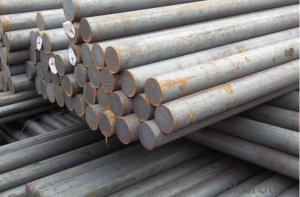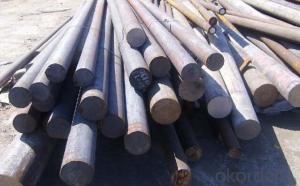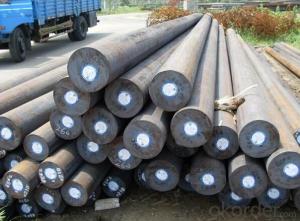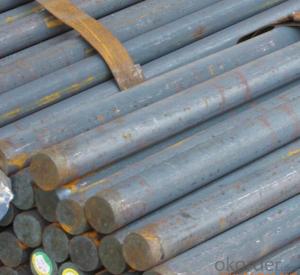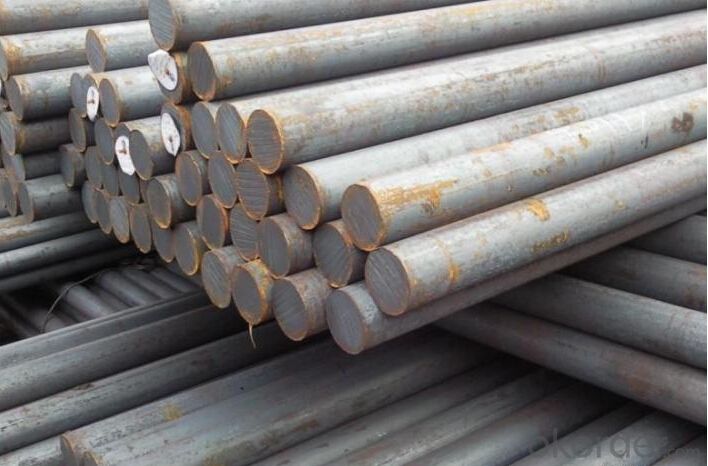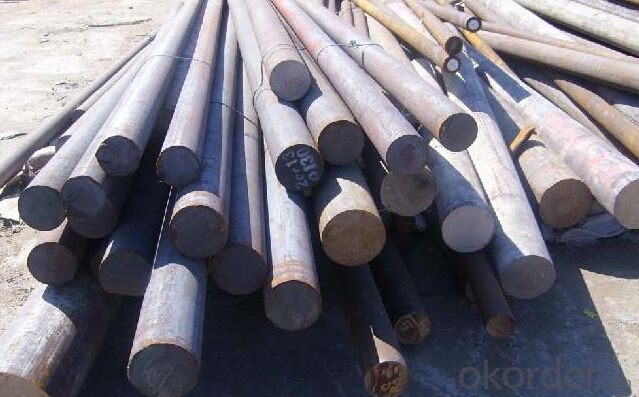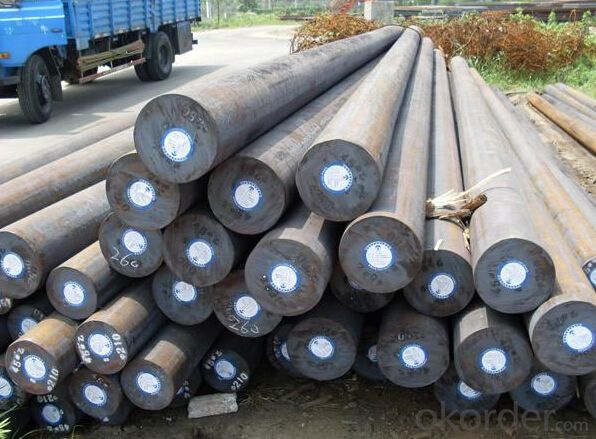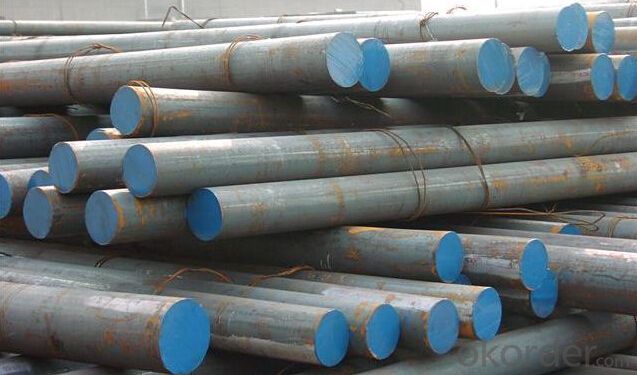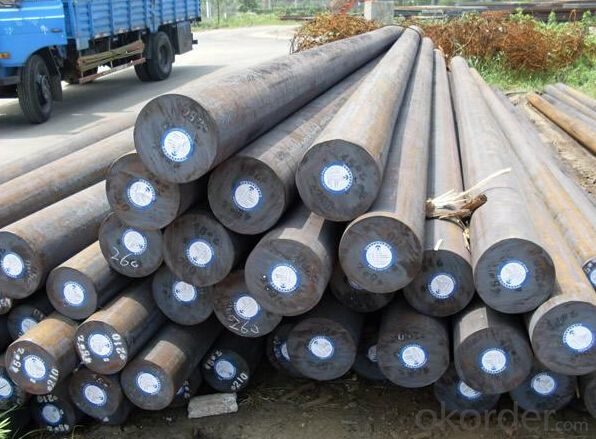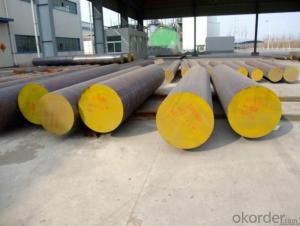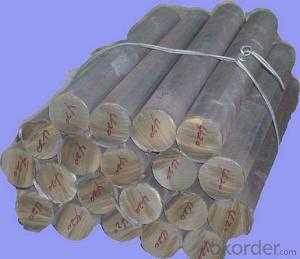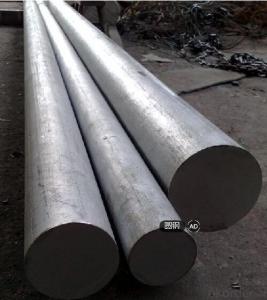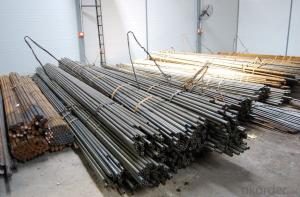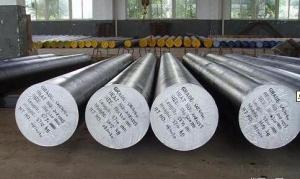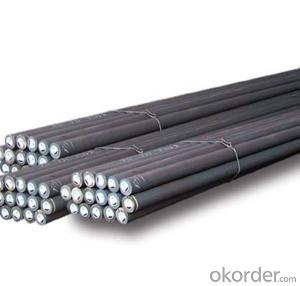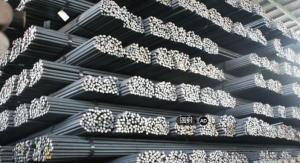Grade DIN1.2601 /Cr12MoV Die Steel Round Bar
- Loading Port:
- Tianjin
- Payment Terms:
- TT OR LC
- Min Order Qty:
- 3 m.t.
- Supply Capability:
- 10000 m.t./month
OKorder Service Pledge
OKorder Financial Service
You Might Also Like
Specification
Grade DIN1.2601 /Cr12MoV Die Steel Round Bar
Name | Carbon Steel Round Bar |
Shape | Round Bar/Square Bar/Flat Bar/Plate/Wire |
Standard | GB/ASTM/SAE/AISI/DIN/JIS/EN/BS |
Surface Treatment: | Black/Peeling/Polished/Machined |
Delivery Condition: | Hot Rolled or Forged/Peeled or Black Surface |
Test | SGS/UT 100% Elements Testing |
Certificate: | ISO/Mill Certificate |
Service: | 24 hours online service / |
more than 20 years trading and manufacture | |
Quality Assurance: | the third party inspection, such as SGS, BV, TUV…etc. is acceptable |
Packaging Details: | seaworthy packaging or as per customer's packing instruction |
Specification
Product Name: | Steel bar 1.2601 Cr12MoV D5 Die steel bar prices | ||||||||
Steel Grade: |
|
| AISI | DIN | GB |
|
|
| |
|
| D5 | 1.2601 | Cr12MoV |
|
|
| ||
Chemical compositions: | C | Mo | Mn | V | Cr | Si | S | P | |
1.45-1.75 | 0.4-0.6 | ≤0.40 | 0.15-0.3 | 11.0-12.5 | ≤0.40 | ≤0.03 | ≤0.03 | ||
Specification: | Flat Bar | Thickness:5-410mm | Width:50-810mm | ||||||
Round Bar | Diameter:12-610mm | ||||||||
Length Range: | 2500mm-5800mm | ||||||||
Delivery condition: | Hot rolled annealed steel in Black surface | ||||||||
Packaging & Delivery
Packaging Detail | Sea worthy packing /as per customer's packing instruction |
Delivery Detail | 15 ~ 40 days after receiving the deposit |
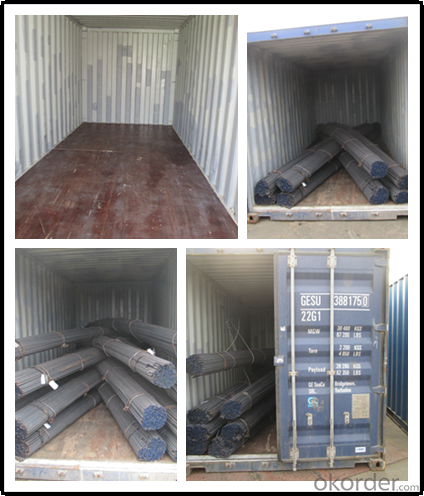
Product Show
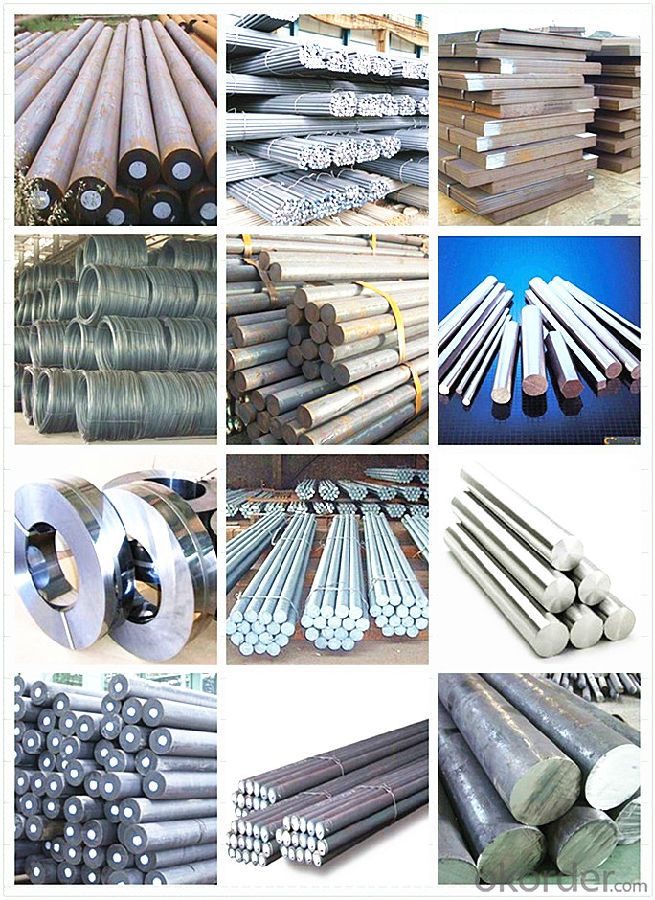
Workshop
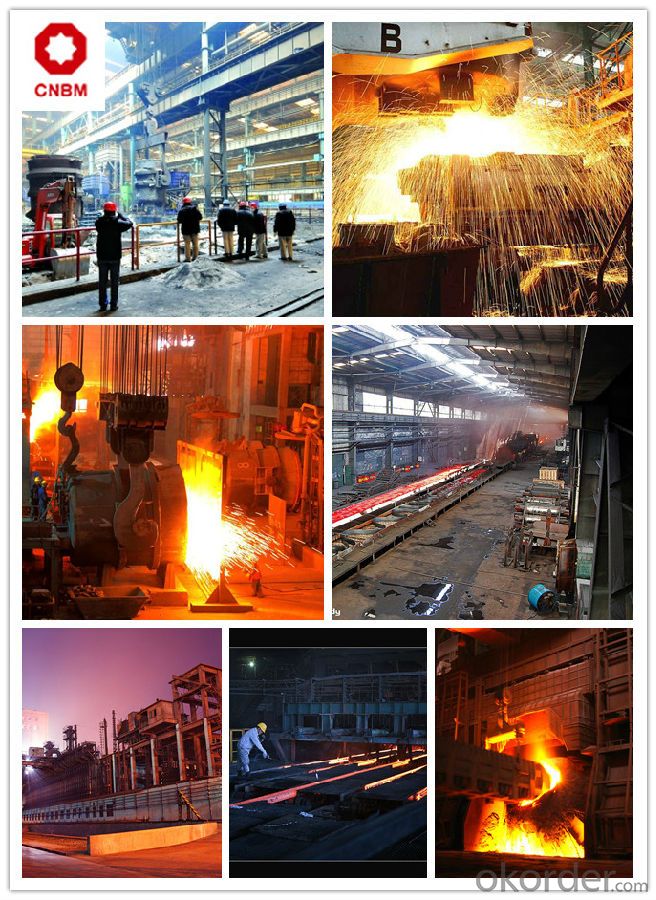
FAQ
Are you a trading company or manufacturer? | Manufacturer |
What’s the MOQ? | 3 metric ton |
What’s your delivery time? | 15-35 days after downpayment received |
Do you Accept OEM service? | Yes |
what’s your delivery terms? | FOB/CFR/CIF |
What's the Payment Terms? | 30% as deposit,70% before shipment by T/T |
Western Union acceptable for small amount. | |
L/C acceptable for large amount. | |
Scrow ,Paybal,Alipay are also ok | |
Why choose us? | Chose happens because of quality, then price, We can give you both. |
Additionally, we can also offer professional products inquiry, products knowledge train (for agents), smooth goods delivery, excellent customer solution proposals. | |
What's your available port of Shipment? | Main Port, China |
What’s your featured services? | Our service formula: good quality+ good price+ good service=customer's trust |
Where are your Market? | Covering more than 160 countries in the world |
- Q: What are the different types of electrical steel?
- There are several types of electrical steel, including grain-oriented electrical steel (GOES), non-grain-oriented electrical steel (NGOES), and silicon steel.
- Q: What are the common challenges in heat treating titanium alloys?
- Heat treating titanium alloys can present several common challenges. One of the main challenges is the high reactivity of titanium with oxygen, nitrogen, and hydrogen at elevated temperatures. This reactivity can lead to surface contamination and the formation of undesirable oxides, nitrides, or hydrides, which can affect the mechanical properties of the alloy. Another challenge is the formation of alpha-case, a thick layer of alpha-phase titanium on the surface of the alloy during heat treatment. Alpha-case is brittle and can significantly reduce the fatigue strength and ductility of the material. Therefore, minimizing or eliminating the formation of alpha-case is crucial in heat treating titanium alloys. Furthermore, titanium alloys have a narrow temperature range for effective heat treatment. If the temperature is too low, it may not achieve the desired microstructure and mechanical properties. On the other hand, if the temperature is too high, it can lead to grain growth, which can reduce the strength and toughness of the alloy. Additionally, the heat treatment of titanium alloys often requires precise control of the heating and cooling rates to achieve the desired microstructure and properties. Rapid or uneven cooling can result in non-uniform microstructures, residual stresses, or distortion of the part. Finally, the cost of heat treating titanium alloys can be a challenge. Titanium alloys have a high affinity for oxygen, which necessitates the use of specialized equipment, such as vacuum furnaces or controlled atmosphere furnaces, to maintain a low oxygen environment. These specialized heat treatment processes can be expensive and require careful handling and maintenance to ensure the desired results. In conclusion, the common challenges in heat treating titanium alloys include managing reactivity with oxygen, nitrogen, and hydrogen, minimizing alpha-case formation, achieving the correct temperature range, controlling heating and cooling rates, and dealing with the cost of specialized equipment and processes. Overcoming these challenges is essential to obtain high-quality titanium alloy components with desired properties.
- Q: What are the different applications of high-speed special steel?
- High-speed special steel is a type of steel that is specifically designed to withstand high temperatures and maintain its hardness at high speeds. It has a wide range of applications across various industries due to its unique properties. Some of the different applications of high-speed special steel include: 1. Cutting Tools: High-speed special steel is widely used in the manufacturing of cutting tools such as drills, milling cutters, taps, and saw blades. Its excellent hardness, heat resistance, and wear resistance make it ideal for machining operations that involve high temperatures and high-speed cutting. 2. Aerospace Industry: The aerospace industry extensively utilizes high-speed special steel in the production of aircraft components. It is used for manufacturing turbine blades, engine parts, and other critical components that require high strength, high temperature resistance, and excellent fatigue resistance. 3. Automotive Industry: High-speed special steel finds its application in the automotive industry, particularly in the manufacturing of engine components, gears, and bearings. Its ability to withstand high temperatures, resist wear, and provide strength makes it suitable for various automotive applications. 4. Power Generation: High-speed special steel is used in power generation industries such as thermal power plants, nuclear power plants, and wind energy. It is used for manufacturing turbine blades, rotors, and other components that operate at high temperatures and high rotational speeds. 5. Tool and Die Making: High-speed special steel is widely used in tool and die making industries where precision and durability are crucial. It is used for producing molds, dies, punches, and other tooling components that require high strength, wear resistance, and toughness. 6. Medical Instruments: High-speed special steel is increasingly being used in the medical field for manufacturing surgical instruments, dental tools, and implants. Its corrosion resistance, high strength, and biocompatibility make it suitable for medical applications. 7. Industrial Machinery: High-speed special steel is used in various industrial machinery applications such as bearings, gears, shafts, and cutting tools. Its ability to withstand high temperatures, resist wear, and provide strength contributes to the efficiency and reliability of industrial equipment. In conclusion, high-speed special steel finds numerous applications across industries. Its unique properties such as high temperature resistance, hardness, wear resistance, and strength make it an essential material for cutting tools, aerospace components, automotive parts, power generation equipment, tool and die making, medical instruments, and industrial machinery.
- Q: What is the significance of special steel in the medical field?
- Special steel, also known as medical grade steel, plays a crucial role in the medical field due to its unique properties and significance. It is specifically designed and manufactured to meet the stringent requirements of the healthcare industry. The significance of special steel in the medical field can be understood through the following points: 1. Biocompatibility: Special steel is biocompatible, meaning it is non-toxic and does not provoke an adverse reaction when in contact with the human body. This makes it an ideal material for medical devices such as surgical instruments, implants, and orthopedic tools. 2. Corrosion resistance: Special steel is highly resistant to corrosion and rust, ensuring the longevity and durability of medical instruments. Instruments used in surgical procedures need to be repeatedly sterilized, and the corrosive nature of sterilization agents can degrade ordinary steel. Special steel, with its superior corrosion resistance, can withstand these harsh conditions, reducing the risk of contamination and maintaining the integrity of medical equipment. 3. Mechanical properties: Special steel possesses excellent mechanical properties, such as high strength, toughness, and ductility. These characteristics are essential for medical devices, as they need to withstand the stresses and strains of surgical procedures, maintain their shape, and provide reliable performance. 4. Sterilization compatibility: Special steel can withstand various sterilization methods, including steam sterilization, ethylene oxide sterilization, and gamma radiation. This ensures that medical instruments made from special steel can be effectively sterilized, preventing the transmission of infections and reducing the risk of contamination during surgeries. 5. Precision manufacturing: Special steel can be fabricated into intricate shapes and sizes, allowing the production of precise medical instruments. Its superior machinability enables the creation of fine and sharp edges, crucial for surgical tools used in delicate procedures. 6. Antibacterial properties: Some special steels, such as stainless steel, possess inherent antibacterial properties. This characteristic is particularly important in the medical field, where the prevention of infections is paramount. Instruments made from antibacterial special steel can inhibit the growth of bacteria, minimizing the risk of post-operative complications. In summary, the significance of special steel in the medical field lies in its biocompatibility, corrosion resistance, mechanical properties, sterilization compatibility, precision manufacturing, and potential antibacterial properties. These qualities make special steel an indispensable material for manufacturing medical devices, ensuring their reliability, durability, and safety for both healthcare professionals and patients.
- Q: What are the requirements for special steel used in high-pressure applications?
- The requirements for special steel used in high-pressure applications typically include high strength, excellent resistance to corrosion and oxidation, good weldability, and the ability to withstand extreme temperatures and pressures without deformation or failure. Additionally, the steel should have a high level of toughness to withstand impact and fatigue loads, as well as good dimensional stability to ensure proper sealing and performance in high-pressure environments.
- Q: Can special steel be used in the nuclear industry?
- Indeed, the nuclear industry finds special steel to be a valuable asset. This type of steel, also referred to as stainless steel, is commonly utilized in nuclear power plants due to its exceptional resistance to corrosion, impressive strength, and capability to endure high temperatures. Given the demanding conditions of nuclear reactors, which involve radiation exposure, high-pressure and high-temperature environments, as well as corrosive substances, the nuclear industry necessitates materials that can withstand such harsh circumstances. Special steel possesses properties that render it suitable for these conditions, including its corrosion resistance and ability to maintain mechanical properties at elevated temperatures. Furthermore, special steel plays a crucial role in the construction of nuclear fuel rods, storage containers, and other vital components. It is crucial to emphasize that the special steel employed in the nuclear industry is subject to rigorous quality control measures and testing in order to ensure its reliability and safety.
- Q: Can special steel be used in railway applications?
- Yes, special steel can be used in railway applications. Special steel, such as high-strength steel or corrosion-resistant steel, can offer enhanced durability, strength, and resistance to wear and tear in railway components, tracks, and infrastructure. This allows for safer and more efficient railway operations.
- Q: What are the main characteristics of structural steel forgings?
- The main characteristics of structural steel forgings include high strength, excellent toughness, and superior fatigue resistance. They are also known for their ability to withstand extreme temperatures and harsh environments. Moreover, structural steel forgings exhibit good weldability and machinability, making them suitable for various engineering applications.
- Q: What are the main applications of special steel in the textile industry?
- Special steel is commonly used in the textile industry for various applications. One of the main applications is in the production of textile machinery, such as looms, spinning frames, and knitting machines. The use of special steel ensures high strength, durability, and precision in these machines, leading to increased productivity and efficiency in textile manufacturing. Additionally, special steel is utilized in the production of textile cutting tools, such as blades and needles, which require excellent hardness and wear resistance. These tools enable precise and efficient cutting of fabrics, contributing to the overall quality of textile products. In summary, special steel plays a crucial role in the textile industry by providing strong and durable machinery and high-performance cutting tools.
- Q: What are the different aerospace grades of special steel?
- Some of the different aerospace grades of special steel include 15-5PH, 17-4PH, 300M, 4130, 4340, 440C, and H11. These grades are specifically designed to meet the high-performance requirements of the aerospace industry, providing excellent strength, corrosion resistance, and heat resistance properties.
Send your message to us
Grade DIN1.2601 /Cr12MoV Die Steel Round Bar
- Loading Port:
- Tianjin
- Payment Terms:
- TT OR LC
- Min Order Qty:
- 3 m.t.
- Supply Capability:
- 10000 m.t./month
OKorder Service Pledge
OKorder Financial Service
Similar products
Hot products
Hot Searches
Related keywords
